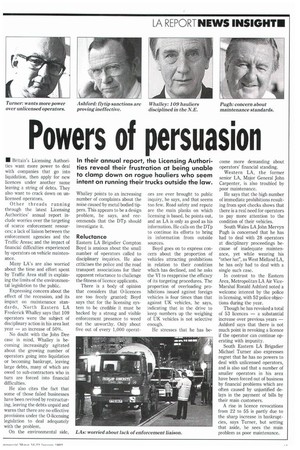Powers of persuasion
Page 17

If you've noticed an error in this article please click here to report it so we can fix it.
In their annual report, the Licensing Authorities reveal their frustration at being unable to clamp down on rogue hauliers who seem intent on running their trucks outside the law.
• Britain's Licensing Authorities want more power to deal with companies that go into liquidation, then apply for new licences under another name leaving a string of debts. They also want to crack down on unlicensed operators.
Other threads running through the latest Licensing Authorities' annual report include worries over the targeting of scarce enforcement resources; a lack of liaison between the enforcement agencies and the Traffic Areas; and the impact of financial difficulties experienced by operators on vehicle maintenance.
Many LA's are also worried about the time and effort spent by Traffic Area staff in explaining the limits of the environmental legislation to the public.
Expressing concern about the effect of the recession, and its impact on maintenance stand a rd s , North Eastern LA Frederick Whalley says that 109 operators were the subject of disciplinary action in his area last year — an increase of 50%.
No doubt with the John Dee case in mind, Whalley is becoming increasingly agitated about the growing number of operators going into liquidation or becoming bankrupt, leaving large debts, many of which are owed to sub-contractors who in turn are forced into financial difficulties.
He also cites the fact that some of those failed businesses have been revived by restructuring, leaving the debts unpaid and warns that there are no effective provisions under the 0-licensing legislation to deal adequately with the problem.
On the environmental side, Whalley points to an increasing number of complaints about the noise caused by metal bodied tippers. This appears to be a design problem, he says, and recommends that the DTp should investigate it.
Reluctance Eastern LA Brigadier Compton Boyd is anxious about the small number of operators called to disciplinary inquiries. He also criticises the police and the road transport associations for their apparent reluctance to challenge the fitness of licence applicants.
There is a body of opinion that considers that 0-licences are too freely granted; Boyd says that for the licensing system to be credible it must be backed by a strong and visible enforcement presence to weed out the unworthy. Only about five out of every 1,000 operat ors are ever brought to public inquiry, he says, and that seems too few. Road safety and repute are the main planks on which licensing is based, he points out, and an LA is only as good as his information. He calls on the DTp to continue its efforts to bring in information from outside sources.
Boyd goes on to express concern about the proportion of vehicles attracting prohibitions in relation to their condition which has declined, and he asks the VI to reappraise the efficacy of its targeting procedures. The proportion of overloading prohibitions issued against foreign vehicles is four times than that against UK vehicles, he says, indicating that in the drive to keep numbers up the weighing of UK vehicles is not selective enough.
He stresses that he has be come more demanding about operators' financial standing.
Western LA, the former senior LA, Major General John Carpenter, is also troubled by poor maintenance.
He says that the high number of immediate prohibitions resulting from spot checks shows that there is a real need for operators to pay more attention to the condition of their vehicles.
South Wales LA John Mervyn Pugh is concerned that he has had to deal with 28 operators at disciplinary proceedings because of inadequate maintenance, yet while wearing his "other hat", as West Midland LA, he has only had to deal with a single such case.
In contrast to the Eastern Area, Metropolitan LA Air ViceMarshal Ronald Ashford noted a welcome interest by the police in licensing, with 52 police objections during the year.
Though he has revoked a total of 53 licences — a substantial increase over previous years — Ashford says that there is not much point in revoking a licence if the operator can continue operating with impunity.
South Eastern LA Brigadier Michael Turner also expresses regret that he has no powers to deal with unlicensed operators, and is also sad that a number of smaller operators in his area have been forced out of business by financial problems which are often caused by unjustified delays in the payment of bills by their main customers.
A rise in licence revocations from 22 to 55 is partly due to the sharp increase in bankruptcies, says Turner, but setting that aside, he sees the main problem as poor maintenance.




















































































